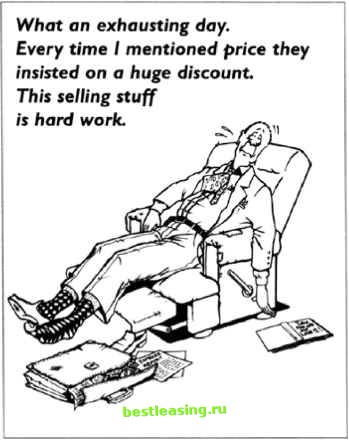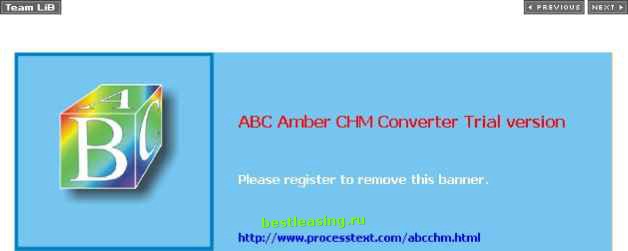

 |
 |

|
Промышленный лизинг
Методички
Is price the most important aspect of the sale? No. Never has been, never will be. Customers have never based their buying decisions solely on price and I doubt they ever will. However, salespeople convince themselves that price is the number one motivator to purchase. Studies show that salespeople bring up price before the customer does 60% of the time. Why? Im not sure but I suppose salespeople feel obligated to bring it up, or perhaps they have been trained to do so. It could even be lack of confidence or corporate self-esteem. Many salespeople violate the sales process by introducing price too soon. Ideally, price should not be discussed until after your initial confirmation. During the call you need to focus on selling value and benefits to the customer. Dont mention price unless the customer asks or you are negotiating. I realize this concept may seem somewhat manipulative and irresponsible, but it isnt. I have confirmed several deals without the customer or me mentioning price. I think its part of the rapport and trust issue I spoke of earlier. If a customer trusts you and feels comfortable with you, price is not an important issue. There is an implied understanding that your price will be competitive, otherwise you wouldnt be in business. By shifting the conversation to price prior to initial confirmation, the salesperson has invited the customer to openly challenge the price. Some salespeople are convinced the customers mandate is to hammer the salesperson into submission, finally succumbing to a rock-bottom price. Classic tactic of a C account. How to negotiate against price and discount pressure is a common challenge among sales professionals. Youve probably heard it before, Your price is too high. Youll just have to do better, or Its a competitive market. Your competitors can beat that price, or Youll have to show more flexibility on your discounting, and so it goes. When salespeople concede too quickly in these situations they not only reduce profitability, but also devalue their customers perceptions of the product or service. Dont respond by asking, Whats the price theyre offering you? or What price do I have to beat? This is a common mistake because it shifts the focus to pure price and discount levels. Experienced negotiators shift the focus to value comparisons versus price comparisons. When dealing with the price issue, be guided by knowing your min-max points. If you have price or discount flexibility, do not give it all away at once. Instead, concede slowly and reluctantly. Also, consider trading price concessions for major commitments. It could sound like this: If I give you X price, will you give me net 10-day terms (or COD terms)? If the customer is insistent on a discounted price dont hesitate to ask for something from them that makes the deal a win-win-win-win. Acknowledge the customers curiosity about price, but dont get sucked into a price debate prior to initial confirmation. For example, when you ask for their business using the five magic words in Chapter 9, your customers may inquire about your price. Simply say, Yes, Im sure we both recognize that price is important, but at this point can we agree to do business together based on the benefits discussed, as long as I can give you a competitive price? If the customer says yes to your initial confirmation, you now have a willing party with whom to negotiate. Consider the initial confirmation as a conditional sale; conditional upon working out terms and conditions supported by a competitive price. What salespeople need to realize is that if a fair price cannot be worked out then there is no deal. Final confirmation is conditional upon successful negotiation. However, dont negotiate all aspects of the deal and then focus separately on price. Make sure price or discount is part of the whole package, not a separate negotiation.  During negotiation be cognizant of your customers behavioral style, and adapt. If you are selling to a Director and she wants to know the price prior to initial confirmation, I would be inclined to acknowledge the request and offer a price range. Dont be exact with your answer. Principle #5: Negotiate the Issues, not the Personalities Often, what causes you to become frustrated or angry in a negotiation is not the topic or issue, but your customers personality traits. By putting emotional distance between yourself and the negotiation you gain a tremendous advantage. Negotiations often unleash emotions that short-circuit rational processes. We sometimes abandon our carefully designed strategy and resort to a flight or fight response. The key to effective, win-win negotiation is to react unemotionally. From time to time you may find yourself dealing with an individual you do not particularly care for. Chances are you wouldnt invite him to go camping with you, but he may represent an A account and a sizeable business opportunity. Experienced negotiators understand that professionalism requires the ability to distance oneself from any emotional distractions. These may include biases, perceptions, values, fear of being exploited, egos, feelings, moods, stress, and so on. Parties can get too caught up in the emotions of negotiation. They become too close to the deal and overlook important facts that may help move the deal forward. In spite of all your efforts to build a personal relationship you may find yourself dealing with just a corporate relationship. You can both still benefit by simply doing business together and nothing else. Dont entangle relationship challenges within the negotiating process. For most salespeople, the major barrier is simply the fear of negotiation. The very thought sends paralyzing shivers up their spines. The toughest hurdle is learning to be confident enough to stand up to the challenge. This means developing the ability to comfortably express a position without hurting anyone or being hurt. Many people find the straightforward, aggressive, business dialogue of negotiation intimidating. Its the same challenge with confirming: the fear of rejection or perhaps sounding too aggressive. Our natural human tendencies prevail-in our adolescent years we were taught that it was polite not to ask for things and never to be confrontational. The best approach to dealing with the emotional aspect of negotiation is the pause button. Pushing the pause button means putting the negotiation on hold while you take a break to reevaluate the situation. This may be for a few minutes or an hour or after you have slept on it. Michael and Mini Donaldson offer this explanation in their book, Negotiation for Dummies: Knowing when and how to push the pause button not only endows you with an aura of composure and confidence, but also gives you control over all the critical points of the negotiation. They go on to say: No single skill can be as helpful to you as the pause button in any situation laden with heavy emotional overtones. Almost by definition, you cannot fully prepare ahead of time for these situations. Your judicious use of the pause button can compensate. Pushing the pause button produces better results... or at least results that you feel better about. The message is clear: dont be afraid to utilize your pause button. Use it to re-evaluate your position. Perhaps in the interest of flexibility it can become an opportunity to reconsider your must-have issues and your min-max points. Remember, with two willing parties, there is always a way. 
1 2 3 4 5 6 7 8 9 10 11 12 13 14 15 16 17 18 19 20 21 22 23 24 25 26 27 28 29 30 31 32 33 34 35 36 37 38 39 40 41 42 43 44 45 46 47 48 49 50 51 52 [ 53 ] 54 55 56 57 58 59 60 61 62 63 64 65 66 67 68 69 70 71 |